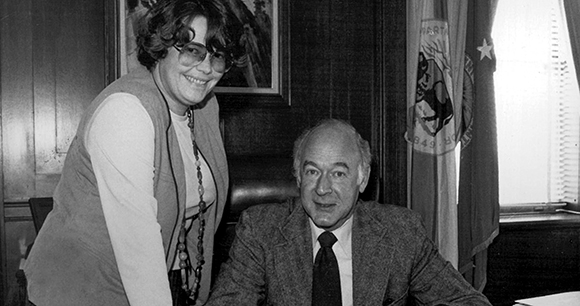Longtime AWI board member Cynthia Wilson died in August at the age of 83. Cynthia served on AWI’s board for over 50 years, chairing the board for the final 20 of those years following the passing of AWI’s founder, Christine Stevens, in 2002.
Cynthia was born in Syracuse, New York, and grew up with a menagerie of animals—the beginning of a lifelong interest in them. (As an adult, her menagerie consisted entirely of cats she had rescued.) She initially stayed in upstate New York to attend St. Lawrence University, where she graduated magna cum laude with a bachelor’s degree in English, before heading to the University of Texas for a master’s in journalism. She had hoped to be a travel writer for Time magazine. At the time, however, the magazine required women to pass a typing test—which Cynthia kept failing.

In the mid-1960s, Cynthia was working at Columbia Records when she received a fortuitous phone call from the White House. Lady Bird Johnson was looking for someone skilled at writing letters. Cynthia was hired and joined Lady Bird’s personal staff, where she had a broad range of responsibilities, including work on the First Lady’s national beautification program.
At the end of the Johnson administration, Cynthia joined the National Audubon Society staff as their first Washington representative. During eight years with Audubon, she wrote and presented testimony, lobbied congressional and agency staff, and worked with the organization’s regional offices and local chapters to develop and implement strategy focusing on wildlife, public lands, and pesticide issues. In Washington, Cynthia befriended Christine after they both testified at a number of congressional hearings on wildlife. In 1971, Christine invited Cynthia to join AWI’s board; a few years later, she was appointed vice president.
At the beginning of the Carter administration, Cynthia was asked to serve as an assistant to Interior Secretary Cecil D. Andrus. She worked on environmental and wildlife issues, including the Alaska National Interest Lands Conservation Act and other legislation that resulted in the creation of 103 million acres of parks and refuges in Alaska. In addition, she served as the secretary’s liaison with Congress, other federal and state agencies, White House staff, Native American tribes, environmental and animal welfare organizations, and the press.
Following her time in the Carter administration, Cynthia held a number of positions in the private sector, including principal resource person for a law firm representing an environmental coalition seeking to block registration of Compound 1080 (a brutal poison used to kill coyotes and other native predators), executive director of Friends of the Earth, and development officer of American Farmland Trust, an organization that seeks to protect the nation’s farmland from development.
We are indebted to Cynthia for her long-standing commitment to animals. The board and the organization benefited greatly from her vast and varied experience highlighted above, and we are grateful for her selfless support of AWI. Cynthia was bright, determined, and articulate—a strategic thinker and planner who was extremely knowledgeable about policy and political process. This dear friend and pillar of the organization will be sorely missed.